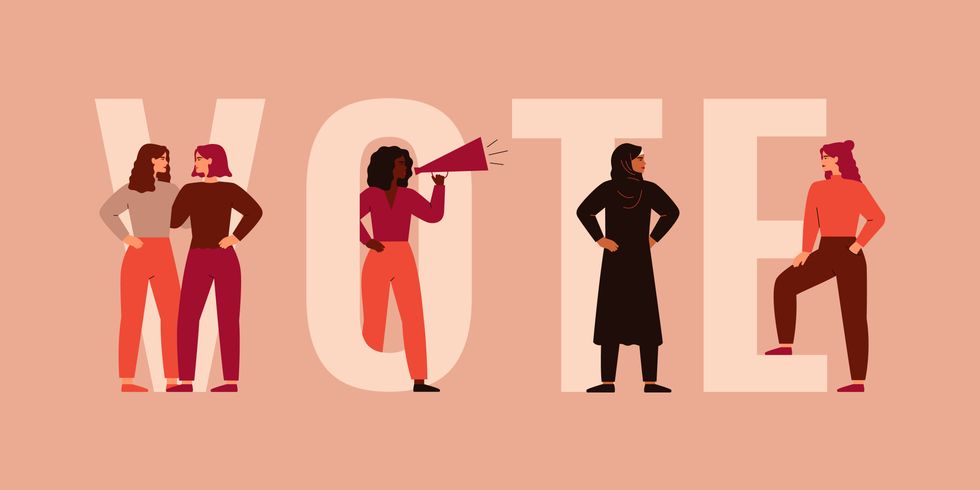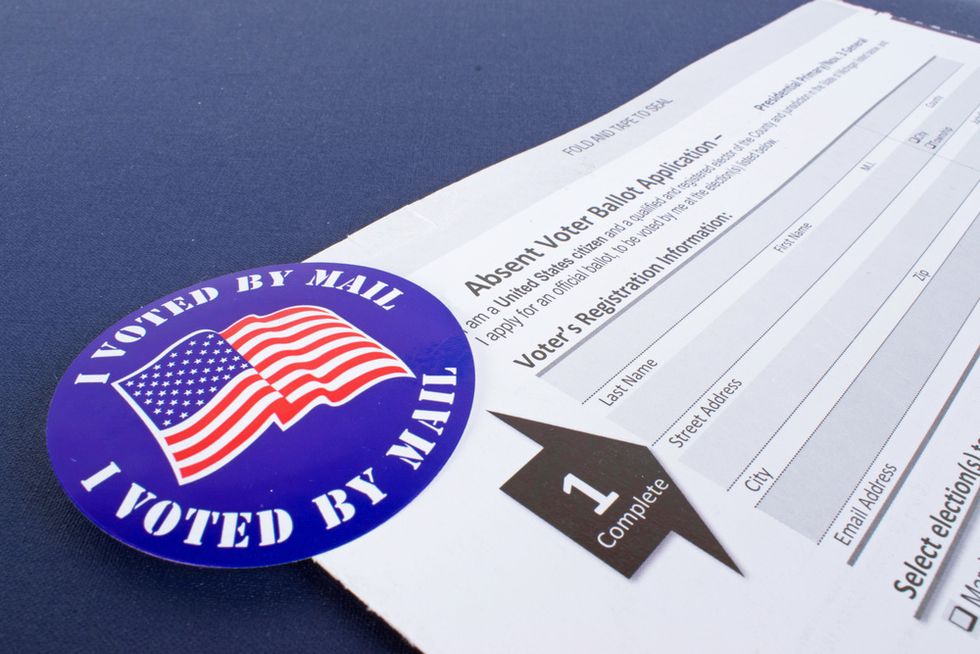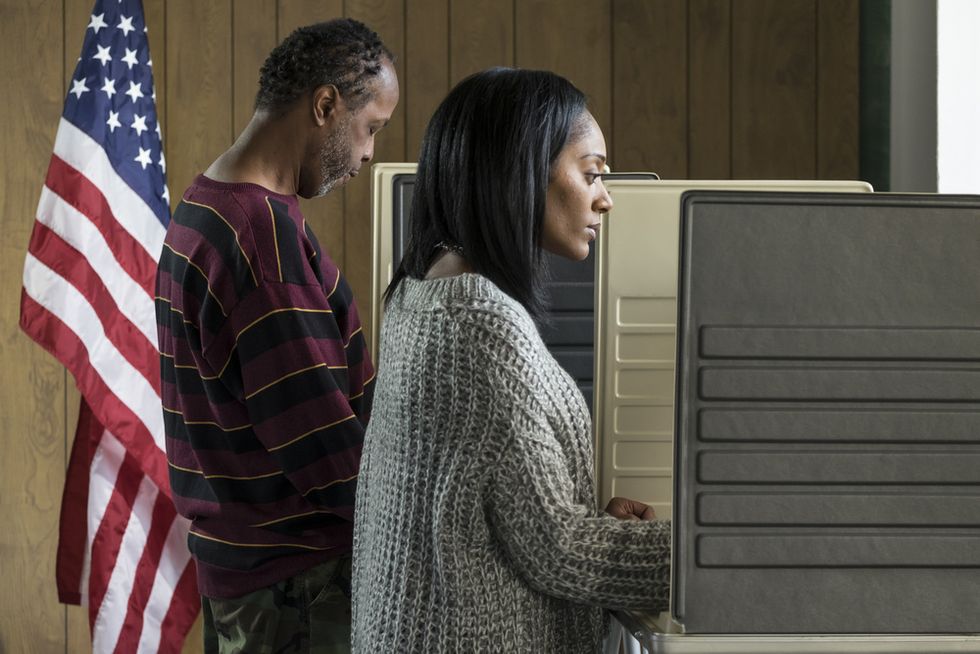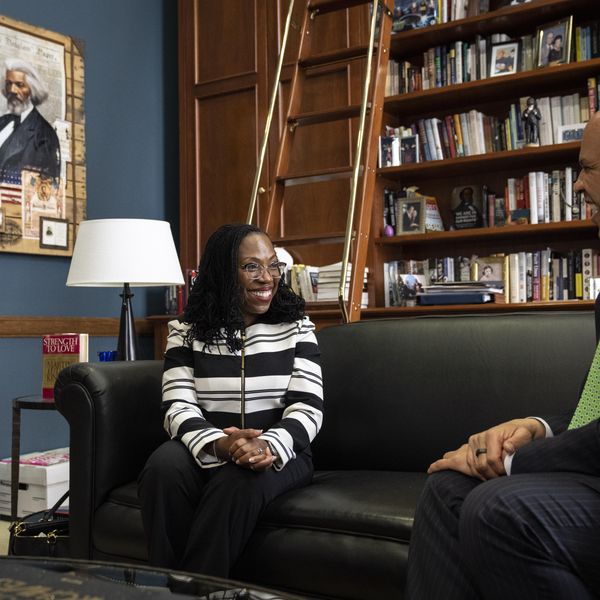
We have a leader who turns a blind eye to racial injustice, face masks and coronavirus testing and thinks it's OK to blind the eyes of peaceful protesters so he can snag a photo op.
I'll walk barefoot across shards of glass and still stand in a line all night to vote him out of office.
Although standing in line all night is a bit of a stretch, more than a few hours has been the norm for 2020 voting so far. In Kentucky's primaries, there were only 200 polling places statewide, down from 3,700 in the 2018 election. But only one polling place was in Jefferson County this past week, where 600,000 of the registered voters live. Half of Black Kentuckians live there, too.
This is classic voter suppression.

Mary Long / Shutterstock
Georgians faced longer lines than usual earlier this month, also. Furthermore, they encountered ballot shortages, which was a whole other issue across many states. Tens of thousands of voters didn't receive the absentee ballots that they requested. And in Maryland, where all registered voters were supposed to have automatically received ballots in the mail, about 160,000 ballots (or roughly 5% of those actually sent out) weren't even delivered, according to CNN.
And Georgia's new voting machine glitches? Those technical issues probably could've been resolved ahead of time through machine testing and volunteer training had 'Rona not forced stay-at-home orders. Experts say these problems only occurred in our predominantly Black communities so that possibly sounds like another case of voter suppression.
Voting rights groups call the most recent primaries a disaster and a sneak-peek into what'll happen in November, particularly in counties where the majority of residents are not white, if these machine glitches and ballot shortage issues aren't fixed. Add to all of that the health officials' predictions of a vicious resurgence of the 'Rona. This pandemic is turning 2020 into pandemonium!
So, how should we prepare? What do we need to do to minimize wait times in line, protect our health and evict the tenant from the DC mansion that sits along Black Lives Matter Plaza? Here's where to start:
Make sure you and your eligible loved ones register to vote online.

Shutterstock
It's a fact that everyone who can vote isn't already registered. New voter registration has declined during the quarantine period. States like Virginia saw 73% fewer registrations in April than it did during the same time in 2016, possibly due to the shutdown of the Department of Motor Vehicles where most residents register to vote. And despite being able to register online, Kentuckian registrations also flatlined in April because door-to-door canvassing and in-person registration booths are much more successful. However, online registration is our best option right now.
If you're a regular of Club Quarantine, then you probably attended #CouchParty 2.0 with When We All Vote, co-chaired by our forever FLOTUS Michelle Obama. The organization reached over 100,000 eligible voters during the virtual registration drive in April. Another resourceful site is Vote.org. Both websites keep the registration process simple. Vote.org says it takes less than two minutes.
It's also best to go ahead and register now even though the deadline for the general election is in October. In case you're a procrastinator, you can get the exact date for your state here. But I repeat: Do it today!
Check your voter registration status.
Nowadays, anything can happen. We might somehow get purged from the voter roll. Or we may arrive at the polling station only for the volunteer to tell us they can't find our name. The devil is a liar, as my cousin often says. There's a link on the When We All Vote homepage that you can click to be sure you're still set to vote before you get to the polls.
Request a general (presidential) absentee ballot.

Shutterstock
Most states offer this option. Again, some states may even automatically send a general absentee ballot to every registered voter like they did for this year's primaries. (If you live in Washington state, Colorado, Oregon, Utah and Hawaii, then this doesn't apply to you because your states hold all of their elections entirely by mail anyway.)
Currently 28 states and the District of Columbia offer "no-excuse" voting by mail, which means any voter can get an absentee ballot if they ask for one. States with stricter laws, like my home state of Virginia, require voters to provide a valid reason on their application explaining why they can't appear at the polls. You have to choose one from the list and provide proof but don't fret: COVID-19 is still in these streets and counts as a legitimate excuse.
Be mindful of the tight deadlines because you want your vote to count! Some states need to receive the ballots back on Election Day while others accept a postmark. States like Virginia will send ballots out 45 days before the election so try to get it as soon as possible. Check your state's absentee ballot deadlines and requirements here.
Also be mindful of your signature. Now is not the time to get fancy with our swoops, slashes and squiggles if that's not how we signed our driver's license. The last thing we want is for our vote to become a provisional ballot and not be counted because the person who compared the signatures thinks ours is inconsistent.
If you don't receive your absentee ballot in a timely manner, please contact your county registrar or Department of Elections. Don't sit at home and wait like this one couple did during the DC primary and ended up not voting at all. If your ballot still doesn't come in the mail, you'll definitely need to vote in-person.
Consider early voting.
I get it. In-person voting is what we're trying to avoid because how can you realistically stand six feet apart on Election Day? Somebody is going to be breathing on the back of your neck and then asking if you mind that they stand that close to you. Early voting is usually available. With early voting, we have a window of time to choose our candidate before November 3. Check early voting dates for your state here.
Know your voting rights before you go!

Shutterstock
Did you know that there is an "inactive" list of voters? If your name isn't on the regular voter roll and you haven't recently voted, your name could be on the other list. If this is the case, you can still cast a regular ballot in the current election. You can also call the Election Protection Hotline at 866-687-8683.
And did you know that if you're already in line when polls close, then you can still vote? Thankfully, voters at the lone polling place in Jefferson County, KY, knew that when some smart official decided to lock the doors promptly at 6pm. They banged on the windows but apparently candidate Charles Booker had to file an injunction with a judge to reopen the doors until 6:30 pm. I'm telling y'all: Voter suppression is real!
But even if you have to vote on actual Election Day after all, do not get discouraged. Awaken bright and early on November 3 and protect yourself: mask, disposable gloves, a little sanitizer, ID and a basic knowledge of your voting rights. And the minute your thoughts shift to "I can't deal with the corona and crowds today!", picture the current tenant in the DC mansion hunkered down in his bunker issuing tear gas orders for another four years all because we're demanding our right to live. Equally.
We can't deal with that, either, sis.
Check your voter registration status or register to vote today at Vote.org.
Featured image by Shutterstock
This Is How To Keep 'Holiday Season Stress' From Infecting Your Relationship
Hmph. Maybe it’s just me, but it seems like there is something really weird happening in the fall season air (because winter doesn’t officially begin until December 21) that cuddle season is in full swing while break-up season is as well. In fact, did you know that break-ups are so popular during the holiday season that December 11 is deemed Break-Up Day?
The reasons why relationships shift around this time vary; however, I did both roll my eyes and chuckle when I read that a very popular one is because it’s an easy way to get out of getting one’s significant other a Christmas present. SMDH.
Anyway, I personally think that the less shallow folks out here may contemplate calling things “quits” or they at least distance themselves a bit from their partner (and what I’m referring to is serious relationships) due to all of the stress and strain that oftentimes comes with the holidays whether it be financial, familial, due to their tight schedules or something else.
Listen, I would hate for you and your man to miss the fun and happiness of experiencing this time of year, all because you are so overwhelmed or irritated that you can’t really enjoy it. That’s why I have a few practical tips for how to avoid allowing the typical holiday season stress from INFECTING your relationship.
Manage Your Expectations
 Giphy
GiphyUnmanaged expectations. If there is a main reason why the holiday season tends to be so stress-filled for so many people, I’d bet good money that this is the cause. And when you’re in a long-term relationship, expectations can manifest themselves in all sorts of cryptic and/or unexpected ways. You might have relatives who assume that you are going to be with them for Thanksgiving or Christmas when you have other plans in mind. You might be thinking that you are going to spend one amount for presents while your man is thinking something totally different. When it comes to scheduling, your signals may be crossed.
And you know what? To all of these scenarios, this is where clear and consistent communication come in. Don’t assume anything. Don’t dictate anything either. From now until New Year’s, mutually decide to check in once a week, just to make sure that you are both on the same page as it relates to the holidays and what you both are thinking will come along with it. The less blindsided you both feel, the less stressed out you will be. Trust me on this.
Set (and Keep) a Budget
 Giphy
GiphyOkay, so I read that last year, 36 percent of Americans incurred some type of holiday-related debt. Hmph. Last year, there was still some sense of normalcy in this country, chile, so I can only imagine what finances are gonna look like over the next several weeks. That said, since I don’t know a lot of people who don’t find being broke stressful, make sure that you and your bae set a budget and then stick to it this year — no ifs, ands or buts.
Because really, y’all — it doesn’t make sense to deplete savings and/or max out credit cards for a few days of giggles only to be damn near losing your mind because you don’t know how to make ends meet come Dr. Martin Luther King, Jr. Day.
And by the way, this tip doesn’t just speak to things like food and gifts; I also mean travel. If it doesn’t make a ton of sense (or cents) to be all over the place this year — DON’T BE.
Keep Matthew 5:37 at the Forefront
 Giphy
GiphyIf off the top of your head, you don’t know what Matthew 5:37 says, no worries, here ya go: “But let your ‘Yes’ be ‘Yes,’ and your ‘No,’ ‘No.’ For whatever is more than these is from the evil one.” That verse right there? Oh, it’s a boundaries lifesaver! I say that because do you see “maybe” or “I’ll think about it” in there? Nope. LOL. It says that you should tell people “yes” or “no” and leave it at that — and that complements Anne Lamott’s quote, “’No’ is a complete sentence” impeccably well. Yeah, you’ve got to remember that anything beyond a yes or no to a request is privileged information; you don’t owe anyone details or an explanation.
Besides, if you are really honest with yourself, when someone asks you something and you give a “Umm, let me think about it” kind of reply, more times than not, you already know what your answer is going to be — so why not let you both off of the hook? Give your response. Commit to that. And let everyone (including yourself) get on with their lives and schedules.
I promise you that when it comes to those holiday parties, you are pissing more folks off by not RSVP’ing or doing so and not showing up than just saying, “Thank you but not this year” off the rip.
Remember That Your Personal Space Is Privilege Not a Right
 Giphy
GiphyA friend of mine recently bought a new house and invited me over to come see it. He’s a single man with no children, so as I was taking in all of the space that he had, especially as I walked through his finished basement, I joked about relatives coming to live with him. “Hell no” and “absolutely not” were pretty much his immediate responses as he went on to say that some folks even had the nerve to be offended when he told them that he had no intentions on taking DNA in.
Ain’t it wild how people think that your stuff is their right? And yes, that brings me to my next point. Your home is your sanctuary space. If you want to host folks this year — cool. If not, ALSO COOL. Please don’t let folks (family included) guilt you into how they want you to act or even into what they would do if the shoe was on the other foot. You are not them — and as one of my favorite quotes states, “If two people were exactly alike, one of them would be unnecessary.” (A man by the name Larry Dixon said that.)
Hell, my friends? They know that I am good for sending them random things that they need or even want all throughout the year. Coming over to hang out at my pace, though. Uh-uh. Chalk it up to being a card-carrying member of the ambivert club yet I like keeping my living space personal — and I sleep like a baby, each and every night, for feeling that way.
Always remember that your space, your time, your resources, your energy and shoot, yourself period (including your relationship), are all things that are your own. You get to choose how, when and why you want to share them. The holiday season is certainly no exception.
Cultivate Some “You Two Only” Traditions
 Giphy
GiphyIt’s not uncommon for some couples to hit me up after the holiday season to “detox.” Sometimes it’s due to the financial drama (and sometimes trauma) that they experienced. Sometimes it’s because they allowed their relatives (especially in-laws) to get more into their personal business than they should’ve. More than anything, though, it tends to be because they didn’t get enough quality time together and so ended up feeling “disconnected.”
Please don’t let that happen. Listen, I’m not even a holidays kind of woman and yet, I will absolutely sit myself down with some hot chocolate and chocolate chip cookies to enjoy a Hallmark holiday film or two. Aside from the fact that most of them are lighthearted and sweet, I also like that they usually focus on couples loving on each other amidst all of the holiday beauty and ambiance — which is something that all couples should set aside some time to do.
Maybe it’s a vacation. Maybe it’s a staycation. Or maybe it’s my personal favorite, A SEXCATION. Whether it’s for a few days, the weekend or even overnight — don’t you let the holidays go by without setting aside time for you and your man to celebrate one another. Don’t you dare (check out “Are You Ready To Have Some Very Merry 'Christmas Sex'?”).
GET. SOME. REST.
 Giphy
GiphyI once read that 8 out of 10 people get stressed out over the holidays and 3 out of 10 lose sleep during to it — and when you’re stress-filled and sleep-deprived, that can absolutely lead to hypersensitivity, making mountains out of molehills and even not being in the mood for sex.
Your relationship can’t afford to go through any of this, so definitely make sure to prioritize rest. I don’t care how unrealistic it might seem during this time, sleep should never be seen as a luxury; it will always and forever be a great necessity.
That said, try to get no less than six hours of shut-eye in (check out “6 Fascinating Ways Sex And Sleep Definitely Go Hand In Hand”) and even ask your bae to take a nap with you sometimes (check out “Wanna Have Some Next-Level Sex? Take A Nap, Sis.”). Not only will sleep help to restore your mind, body and spirit but, when it’s with your partner, it’s an act of intimacy that can make you both feel super connected, even in the midst of what might feel like chaos.
___
Holiday season stress is real. Still, never give it the permission or power to throw your relationship off. Put you and your man first and let the holidays be what they are gonna be, chile.
Let’s make things inbox official! Sign up for the xoNecole newsletter for love, wellness, career, and exclusive content delivered straight to your inbox.
Featured image by Shutterstock
Dreaming Of A White Christmas? These 7 Winter Wonderland Destinations Are Perfect For The Holidays
While most people opt for a tropical vacation during the winter months, there are still many people who want to fulfill their winter wonderland fantasies, which are more than likely centered on watching snow by the fireplace while sipping some hot cocoa.
With Thanksgiving vastly approaching and Christmas a little under a month away, there is still time to ditch the traditional Christmas home to visit family or friends.
Whether you’re looking to put a new stamp on your passport and keep things domestic with a destination in the States, xoNecole has you covered with a few hotspots for those itching to go somewhere cold (but with cozy vibes) this holiday season.
Aspen, Colorado
Our Christmas queen, Mariah Carey, has been taking an annual trip to this snowy destination since 1997, just three years after dropping the track that would make her the unofficial (but official to us) ambassador of the winter holiday.
Aside from being a key vacation spot for one of the culture’s greatest musicians, Aspen also offers travelers access to world-class skiing and snowboarding and four distinct mountains that provide the perfect backdrop for a winter vacation.
Whistler, British Columbia, Canada
Home to the largest ski resort in North America, Whistler Blackcomb, this destination is located in the Coast Mountain Range and is about 75 miles north of Vancouver.
From luxury spas like Scandinave Spa Whistler to Olympic Park, this is another top winter vacation spot that offers a unique experience for people who love snow and the thrill of a good adventure.
Western Massachusetts
Dubbed the place for a magical holiday escape, Springfield, Massachusetts, blends the warmth of small-town charm with unforgettable experiences like Grinchmas at Springfield Museums, Winterlights at Naumkeag in Stockbridge, Historic Deerfield’s Winter Frolic, and many others.
This destination offers something for all ages, and it’s close to home, making it all the more reason to place on your radar for a winter getaway.
Rovaniemi, Finland
If you want to really get into the Christmas spirit, this just may be the place for you. As the official home to Saint Nick himself, Rovaniemi, Finland offers reindeer sleigh rides, the opportunity to stay in a glass igloo, as well as an opportunity to experience the Santa Claus Village.
Lake Tahoe, California/Nevada
Who says that visits to the lake house are only reserved for summer vacation? A winter trip to Lake Tahoe is equipped with stunning lake views and top-notch ski resorts, including Heavenly and Northstar.
Chamonix, France
Sitting at the base of Mont Blanc, Chamonix, France, is known for its skiing and mountaineering. This destination is home to the Aiguille du Midi cable car, the charming Alpine village, and is also close to various other European ski destinations.
Northeastern Pennsylvania
This area of the U.S. state is home to the Poconos Mountains, whose renowned ski resorts include Camelback Mountain, Blue Mountain, and Jack Frost Big Boulder. Whether you’re a ski expert, a beginner, or just there for the vibes, this destination makes for a winter vacation that balances fun adventures and cozy getaways. Additionally, Pennsylvania is home to the Christmas Tree Capital of the world.
Feature image by Shutterstock
Originally published on November 23, 2024









